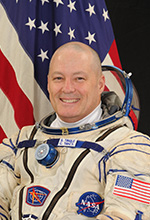Scott D. Tingle
Deputy Chief and Astronaut
NASA Johnson Space Center
MSME 1988
For his exceptional service to his country and remarkable performance as an engineer and astronaut.
As a Kung Fu disciple, a rock band member, a fighter pilot and an astronaut, Scott Tingle serves as a role model much like his hero and fellow alumnus, Neil Armstrong. With his strong record of national service and his forward-looking technical vision,Tingle has repeatedly proven he is a leader in his own right.
“If you go to Purdue, you’ll be prepared academically, technically and practically,” Tingle says. “We’re the kind of people that like to get up to our elbows in grease. We know how systems go together and how to work in a team.”
For that teamwork as an astronaut, in addition to his solo work as a fighter pilot for the U.S. Navy, Tingle has received a Defense Superior Service Medal, a Legion of Merit, a Meritorious Service Medal, three Air Medals and six Navy Commendation Medals.
Tingle is quick to credit Purdue for providing him the basis for his distinguished career: “Purdue taught me that I could excel and that all I needed was to work very hard. Some things came easily, some didn’t.
“I continually rely upon a strong foundation in engineering fundamentals. No matter how complex an aircraft, weapons system or spacecraft can be, they will be governed by the fundamentals. Purdue does a wonderful job of relating engineering theory to operational reality. Most engineering problems are dynamically complex and encompass many possible solutions. Purdue engineers understand this, and they naturally line up the options, provoke good thought and make good decisions.”
Tingle shows his affinity for Purdue and its current and future students with visits to campus to take part in annual Space Day events, and with his participation as a member of the Purdue Alumni Association.
The late Alan McDonald, professor of mechanical engineering and a distinguished fluid mechanics researcher, was Tingle’s favorite professor. Patient, and “incredibly supportive,” Tingle says, McDonald also had brilliant foresight.
“During my first day of mechanical engineering graduate school, Dr. McDonald asked his students what they wanted to do as professional engineers,” Tingle recalls. “I mentioned that I wanted to be an astronaut. Of course, there were a few chuckles from the other students. And then, for the first time in my life, Dr. McDonald, a very accomplished adult, looked over his reading glasses and said, ‘Purdue has a great history of training astronauts. I don’t doubt for one minute that you will be an astronaut.’ The chuckles stopped, and my training began.”
Engineers turn dreams into reality. Be an engineer, always!”Scott Tingle
Career Highlights
| 2018-present | Deputy Chief and Astronaut, NASA Johnson Space Center |
|---|---|
| 2009-2018 | Astronaut, NASA Johnson Space Center |
| 2008-2009 | Assistant Program Manager, Systems Engineering, Precision Strike Weapons, U.S. Navy |
| 2005-2008 | Ship Suitability Department Head, Developmental Test Pilot, Air Test and Evaluation Squadron, U.S. Navy |
| 2003-2005 | Chief Operations Officer, Strike-Fighter Pilot Squadron 97, U.S. Navy |
| 2002-2003 | Assistant Chief Operations Officer, Strike Fighter Wing Pacific Fleet, U.S. Navy |
| 2000-2002 | Staff Landing Signals Officer, Carrier Air Wing 11, U.S. Navy |
| 1998-2000 | Test Pilot, Air Test and Evaluation Squadron 9, U.S. Navy |
| 1997-1998 | Test Pilot Under Instruction, U.S. Navy |
| 1991-1996 | Officer, Strike Fighter Pilot, U.S. Navy |
| 1989-1991 | Technical Staff Member, Propulsion Department, |
Education
| 1987 | BSME, Southeastern Massachusetts University |
|---|---|
| 1988 | MSME, Purdue University |

